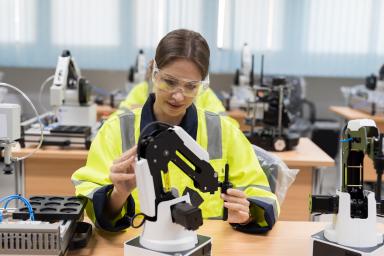Advice from sustainable start-ups on launching a business
Starting an eco-friendly business tackling issues such as climate change or plastic waste could be an ideal combination of entrepreneurial thinking and planet-saving activity.
With consumers looking to businesses that value sustainability - one in three consumers claimed to have stopped purchasing brands or products that they have sustainability or ethical concerns about in 2021 - start-ups that place sustainability at the heart of their offering could benefit from greater consumer awareness.
The same report found that nearly one-third of consumers are highly engaged with adopting a more sustainable lifestyle.
The government's call for a greener economy could open the way for new, sustainable start-ups to launch and capitalise on the shift in consumer trends.
From natural-ingredient products that do away with toxic chemicals to zero-waste plastic-free shops, the UK is seeing a range of start-ups that focus on sustainability.
If you're thinking about launching a sustainable start-up, it can be hard to know where to start or what to expect.
Several eco-friendly business founders shared their advice on getting their green idea off the ground and into commercial reality.
Matt O'Crowly - founder of Tanki
Matt O'Crowley conceived the business idea of Tanki - a plastic-free toilet roll - when his normal work dried up during the Covid-19 pandemic leaving him without an income.
From an initial eureka moment during lockdown to huge growth in just 18 months, Tanki has been an environmental and business success story.
Unlike traditional loo roll, Tanki uses a special process that avoids laminates and mico-plastics, with the toilet paper made from virgin pulp - a by-product of timber grown for sustainable, verified, and actively managed housing.
It was recently Runner Up in the British Business Bank's Social Impact Business of the Year Award.
"Research what you are doing as a business," advises Matt.
"Sometimes, what feels green isn't the case. Learn about your supply chain, figure out your waste stream and peer test it."
"You've got to grab the sustainability nettle and understand exactly what it is. It's a fantastic outcome, which protects the earth and the environment, but sustainability is actually a management system. If you adopt this system, it gives you an instant structure within the business and helps solve problems as they occur," he says.
Matt also thinks that businesses need to make sustainability part of everyday marketing.
"Customers expect things to be sustainable now. That's why we don't make a big thing about being plastic-free because we're very close to the point where people expect this rather than it being something special."
Cherisse Bown - founder of Urbee
Short for 'Urban Bee', Urbee supports pollinator insects through its environmentally-friendly bee-themed products.
The sustainable company arose from founder Cherisse Brown's love of wildlife and the natural world, and it supports the charity Buglife .
And her advice to sustainable start-ups?
"Be honest about your products. There's nothing wrong with changing items to being more eco-friendly as and when you can as part of your journey. Having sustainable practices takes time and a lot of research, but once you get going, it becomes easier as you gain knowledge."
"Research your supply chain right down to the end product," she advises.
"There's so much greenwashing out there, where products are labelled as green. I've had suppliers lie to me and send me fake documents about their sustainability. That's not the way to do business."
She admits that choosing to work with UK suppliers was initially a challenge: "Upholding the business's sustainable principles meant working mainly with independent manufacturers in the UK despite there being so many cheaper suppliers abroad. But if something is important to you, stick to it."
The reward has been worth it, according to Cherisse: "It's rewarding knowing that it's helping such an important cause. I have recently had statistics from Buglife as to what the last two years of donations have purchased, and Urbee has bought enough wildflower seed for 2,000sqkm."
Alice Bardwell - founder of Pit-Tastic
Pit-Tastic 's deodorant bars are 100% natural, biodegradable, and plastic-free by ditching plastics, parabens and aluminium found in skincare products.
Formulated and created in Devon by founder Alice Bardwell, she has followed up on launching her product by opening her zero-waste shop and sustainable cafe.
"I saw a huge trend in plastic-free shops opening up in 2018," reveals Alice on the inspiration behind opening her zero-waste shop.
"We've got so much plastic in our world and plastic in our bodies through what we're eating."
Her advice to sustainable start-ups is to examine every aspect of your business and see where you can be kinder to the environment.
"Look at everything from your electricity consumption to water consumption to what type of paper you're using," she says.
"It's the same as you would do in your own home, looking at your office or your space and changing something that you use every single day to become plastic-free. It's just making one small change to a desk or unit. And take time to measure the carbon footprint of your business."
Learn with Start Up Loans and help make your business born sustainable.
Thinking of starting a sustainable business? Check out our free online courses in partnership with The Open University on environmental decision-making and how organisations impact the environment.
Our free Learn with Start Up Loans courses include:
Plus free courses on climate and sustainability, teamwork, entrepreneurship, mental health and wellbeing.
Disclaimer: The Start -Up Loans Company makes reasonable efforts to keep the content of this article up to date, but we do not guarantee or warrant (implied or otherwise) that it is current, accurate or complete. This article is intended for general information purposes only and does not constitute advice of any kind, including legal, financial, tax or other professional advice. You should always seek professional or specialist advice or support before doing anything on the basis of the content of this article.
The Start-Up Loans Company is not liable for any loss or damage (foreseeable or not) that may come from relying on this article, whether as a result of our negligence, breach of contract or otherwise. “Loss” includes (but is not limited to) any direct, indirect or consequential loss, loss of income, revenue, benefits, profits, opportunity, anticipated savings, or data. We do not exclude liability for any liability which cannot be excluded or limited under English law. Reference to any person, organisation, business, or event does not constitute an endorsement or recommendation from The Start-Up Loans Company, its parent company British Business Bank plc, or the UK Government.
Your previously read articles
Sign up for our newsletter
Just add your details to receive updates and news from Start Up Loans
Sign up to our newsletter


